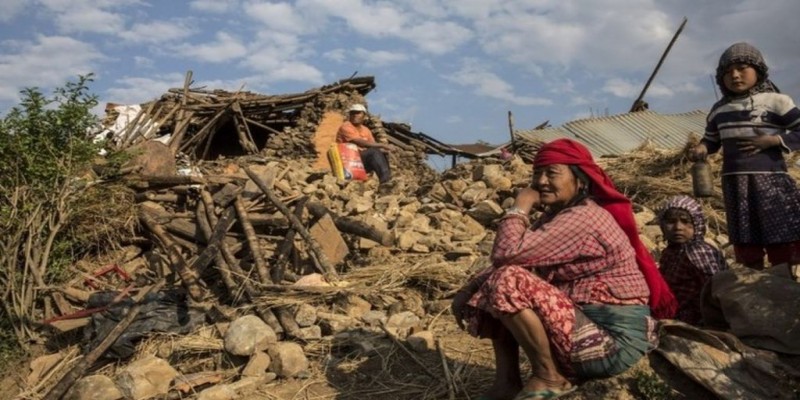
Champions of Charity - Contributors for Helping Hand for Humanity Fund for #NepalEarthquake
2015-05-04 -- HERD
We have received overwhelming positive response after announcing Helping Fund for Humanity Fund to be handed over to the Ministry of Health and Population to support government's efforts in relief operations to affected areas.
We would like to acknowledge them as Champions of Charity as they have been gracious enough to donate in this dire situation.
As of 12 noon, June 22, CONTRIBUTORS DONATING INTO OUR RELIEF FUND:
|
SN |
Name |
Donated Amount (USD) |
Donated Amount (NRS) |
Country of Residence |
|
1 |
Mr. Rajan Paudel |
2050 |
205000 |
USA |
|
2 |
Ms. Sylvia Meek |
1500 |
150000 |
UK |
|
3 |
Leeds Institute of Health Sciences |
1475 |
147500 |
UK |
|
4 |
St. Margaret School |
1134 |
113400 |
UK |
|
5 |
Ms. Shiva Dahal |
1007 |
100660 |
Nepal |
|
6 |
Ms. Miranda Brouwer |
1000 |
100000 |
Netherlands |
|
7 |
Mr. Shyam Narayan |
1000 |
100000 |
USA |
|
8 |
Dr. Sushil Baral |
1000 |
100000 |
Nepal |
|
9 |
Deer Horn Restaurant and Bar |
937 |
93717 |
Hong Kong |
| 10 | Dr. Caroline Rumble | 660 | 66000 | UK |
|
11 |
Ms. Doreen Elsey |
600 |
60000 |
UK |
|
12 |
Dr. Amit Bhandari |
605 |
60500 |
Nepal |
|
13 |
Ms. Ritu Thapa |
500 |
50000 |
USA |
|
14 |
Dr Helen Elsey |
450 |
45000 |
UK |
|
15 |
Yorkshire and Humber Registrars |
430 |
43000 |
UK |
|
16 |
Dr. Damianos Odeh |
400 |
40000 |
USA |
|
17 |
Dr. Hilary Wallace |
400 |
40000 |
Australia |
|
18 |
Mr. Sunil Khadka |
250 |
25000 |
Nepal |
|
19 |
Dr. Ranjan Thapa |
250 |
25000 |
Nepal |
|
20 |
Mr. Ravi Puthumbaka |
200 |
20000 |
USA |
|
21 |
Ms. Swachitha Kothapally |
200 |
20000 |
USA |
|
22 |
Ms. Kabita Sharma |
200 |
20000 |
Nepal |
|
23 |
Heather Thomson |
190 |
19000 |
UK |
|
24 |
Dr. Leena Bhandari |
170 |
17000 |
Nepal |
|
25 |
Afanta Saving and Credit Cooperative |
150 |
15005 |
Nepal |
|
26 |
Ms. Rekha Khatri |
150 |
15005 |
Nepal |
|
27 |
Mr. Tim Martineau |
150 |
15005 |
UK |
|
28 |
Mr. Kumar Jung Malla |
134 |
13350 |
Nepal |
|
29 |
Mr. Bhubal Rai |
110 |
11000 |
Nepal |
|
30 |
Mr. Rassi Christian |
101 |
10115 |
UK |
|
31 |
Dr. Pius Ojara |
100 |
10000 |
Uganda |
|
32 |
Mr. Bijay Thapa |
100 |
10000 |
Nepal |
|
33 |
Mr. Santosh Giri |
100 |
10000 |
Nepal |
|
34 |
Mr. Sudip Pokhrel |
100 |
10000 |
Nepal |
|
35 |
Mr. Basanta Pokhrel |
100 |
10000 |
Nepal |
|
36 |
Mr. Prabin Raj Pokhrel |
100 |
10000 |
Nepal |
|
37 |
Dr. Ashish KC |
100 |
10000 |
Nepal |
|
38 |
Ms. Sabita Pokhrel |
100 |
10000 |
Nepal |
|
39 |
Ms. Shophika Regmi |
100 |
10000 |
Nepal |
|
40 |
Ms. Saroni Pandey |
100 |
10000 |
Nepal |
|
41 |
Ms. Ranju Sharma |
100 |
10000 |
Nepal |
|
42 |
Mr. Prasanna Kharel |
100 |
10000 |
Australia |
|
43 |
Ms. Sudeepa Khanal |
100 |
10000 |
Nepal |
|
44 |
Ms. Abriti Arjyal |
100 |
10000 |
Nepal |
|
45 |
Ms. Nabita Sharma |
100 |
10000 |
Nepal |
|
46 |
Ms. Pushpa Shrestha |
100 |
10000 |
Nepal |
|
47 |
Mr. Pradip Paudel |
100 |
10000 |
Nepal |
|
48 |
Mr. Suwaluck Nilboran |
80 |
8000 |
Thailand |
|
49 |
Mr. Kishore Dhungana |
70 |
7000 |
Nepal |
|
50 |
Mr. Dennis Jane |
50 |
5000 |
UK |
|
51 |
Mr. Pradip Paudel |
50 |
5000 |
Nepal |
|
52 |
Ms. Chandnee Jha |
50 |
5000 |
Nepal |
|
53 |
Mr. Ram |
50 |
5000 |
Saudi Arabia |
|
54 |
Ms. Dana Thompson |
50 |
5000 |
USA |
|
55 |
Mr. Pramod Shrestha |
30 |
3000 |
Nepal |
|
56 |
Mr. Hari Shrestha |
30 |
3000 |
Nepal |
|
57 |
Mr. Gyanendra Shah |
30 |
3000 |
Nepal |
|
58 |
Mr. Hari K. Sharma |
30 |
3000 |
Nepal |
|
59 |
Mr. Keshab Acharya |
30 |
3000 |
Nepal |
|
60 |
Mr. Rajesh Shah |
30 |
3000 |
Nepal |
|
61 |
Mr. Binaya Rai |
30 |
3000 |
Nepal |
|
62 |
Ms. Neelakshi Shukla and Mr. Shalabh Singh |
30 |
3000 |
Nepal |
|
63 |
Ms. Shobha Pokhrel |
10 |
1000 |
Nepal |
|
Total Amount Collected |
19,703 |
1,970,257 |
|
|
CONTRIBUTORS SUPPORTING US BY PROVIDING DIFFERENT MATERIALS
|
ITEM |
QUANTITY |
CONTRIBUTOR |
|
Reproductive Health Bag |
10 Bags |
UNFPA |
|
Reproductive Health Kit |
100 packets |
UNFPA |
|
Rice |
8 sacks |
FNCCI |
|
Sanitary Pad |
38 packets |
FNCCI |
|
Bitten Rice |
25 sacks |
FNCCI |
|
Drinking Water |
1000 bottles |
UNICEF |
|
Medical Tent |
2 tents |
UNICEF |
|
Baby Set |
50 pieces |
UNICEF |
|
Baby Wrapper |
100 pieces |
UNICEF |
|
Delivery Kits |
50 boxes |
UNICEF |
All the details of the collected amount in the relief fund and the expenditure in supply of relief materials will be disseminated publicly through HERD's website and social media accounts. Other individuals and organizations have also pledged for donation to the relief fund. We expect more funds in a few days.
Read more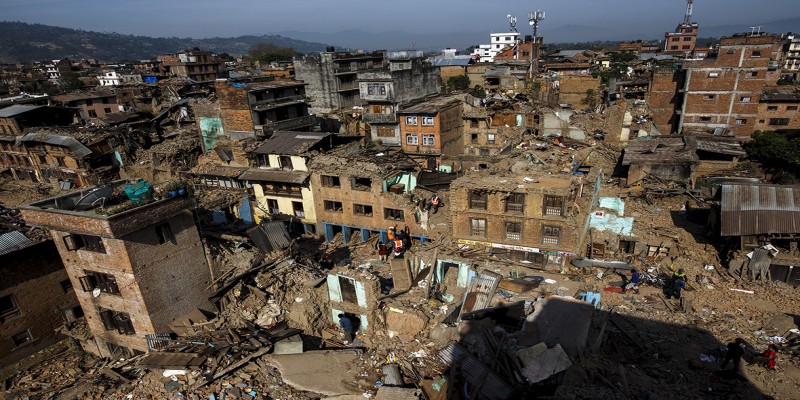
Media Monitoring of #NepalEarthquake - May 1
2015-05-01 -- HERD
With an interesting story in Republica of a woman rescued alive after 128 hours of earthquake, as of today’s statistics, Setopati reports that the death toll reaches over 6250 and about 14000 people have been injured. While conducting rescue and relief operations, since Saturday, 13 security forces have been killed with 101 injured and 10 missing. Other major stories covered today upto 5 pm (Nepali local time) in national and international media as well as social media, categorized under various topics are presented below:
Possibility of Outbreaks
Today too in the media, concerns have been expressed at the individual and institutional level with expressions of extreme caution needed as cases of diarrhea likely to rise and widespread awareness needed regarding consuming cooked or packed food; boiled or chlorinated water. The Indian Express also reports on the epidemic fear in camps where the survivors are residing in temporary settlements that are unhygienic. Moreover, ABC Newshas also reported that the smell of bodies is preventing survivors from returning to their homes. In order to limit the possibility of outbreaks, biomedical researcher Dr. Sameer Mani Dixit on Twitter opines that surveillance for infectious disease transmission is important.
Food, Drugs and Supplies
The situation of earthquake survivors is still miserable as media reports suggest. Image Khabar.com reports that people are forced to live only by drinking water. In places such as Melamchi and Bhalche, people are still awaiting for tents to be provided and people are forced to sleep under the sky. Pahilo Post also reports that the people of Bhaktapur are deprived of relief materials. There have also been reports of robbery of relief materials in Sindhupalchowk and Dolakha which clearly depicts that the supply of relief materials has clearly not met the actual demand by the earthquake victims.
Emergency Care
In terms of emergency care, Doctors without Borders have been providing emergency treatment in different affected areas and has been treating patients with severe emergency cases as for instance a woman being carried on her son’s back for 5 hours and then being treated. In order to support the current communications network for relief operations, BBCalso launched Viber Emergency Information Service in English and Nepalese.
Aid Management
Support in terms of financial aid is growing with Big Lottery Fund committing fund of 2 million pounds for post crisis community rebuilding in Nepal. UNICEF UK also mentions that the British citizens have collected 26 million pound so far for the quake victims courtesy an appeal made by Disasters Emergency Committee which is an umbrella organization of 13 aid charity organizations. UNICEF also has launched a 50 million pound appeal to get more vital aid to affected children. Similarly, Chaudhary Foundation has also started earthquake relief funds to aid in channeling donations effectively. With the realization that there is global concern for the quake victims and willingness for increased funding, Time Inc. Network also has suggested some alternative ways of funding options to this cause.
Government Efforts
A major step made by the government is the launch of earthquake relief fund as a single portal with all sorts of required information about the earthquake. This site includes information on important resources, helpline number, bank details of Prime Minister’s Relief Fund, Rescue and Relief Operations, List of Casualties, Press Releases and National/International Initiatives. It also includes information on contact numbers of police offices in affected areas, earthquake helpline, relief activities done by different ministries, search and rescue activities, airlifts, foods and supplies distributed, among others. There is also a provision of online donation for earthquake victims made by the government.
Government of Nepal has also planned to set up a fund worth Rs. 200 billion for reconstruction all over Nepal post the earthquake disaster. Setopati reports that 140 million rupees has been collected in PM’s Natural Disaster Rescue Fund. As a reaction to the criticism about late delivery of relief supplies, Republica reports that Prime Minister has directed Nepal Army for prompt delivery of relief materials while the government has also made a provision to allow the relief aids to be distributed by the non government and private organizations only in places selected by the government.
Public Reactions
Public reactions post the earthquake has been a mixed bag. Some have praised the level of concern shown towards supporting the quake victims as one individual on twitter writes, “Every person seems to be discussing what they can do for the victims. Never seen anything like that.” Another individual writes, “These days I am more worried about Kathmandu than my own life”. These are strong expressions of public display of human emotions flowing through the catastrophic damage of lives, property and dampened spirits. Some believe that for long term assistance, Prime Minister’s Relief Fund is the most appropriate choice. Some individuals have also expressed their anger over political leaders for not being too concerned with relief works as in the case of Panga in Kirtipur.
Rescue Efforts
Relief has been provided by USAID through humanitarian aid while religious community, Delhi Gurudwara is sending 25000 packets of food to Nepal every day. Fishtail Air helicopters are evacuating stranded villagers and tourists in Lukla while Doctors without Borders claims that a cargo plane carrying 35 tons of medical and logistics supplies including an inflatable field hospital landed last night at Kathmandu airport. Drones have been used especially to locate the devastation and affected sites while Kathmandu Living Labs in coordination with Humanitarian Open Street Map Team Mapbox Bangalore, Nepal Monitor and Parewa Labs have brought together over 2500 mappers globally to contribute to the OpenStreetMap platform to aid agencies and volunteers to plan and target their relief efforts. Setopati has covered news of high number of rescues in Gorkha while at the same time reports of no rescue efforts in Tatopani. Red Cross also realizes that greater urgency in relief efforts is required.
As a recommendation to standard rescue efforts UNOCHA lists areas to be focused while conducting rescue operations namely: Nutrition, Protection, Education, Shelter and Non-Food Items, Camp Coordination and Camp Management, Coordination between various stakeholders, Early Recovery, Logistics and Access, Emergency Telecommunications, Health, Water, Sanitation and Hygiene, Food Security.
The Impact
As a direct impact due to the earthquake, Asian Development Bank has conducted an analysis of the economic impact of the earthquake. Major predictions made are:
- Decline in production activities especially in the service sector
- Travel and tourism likely to be badly hit with key hotels closing down
- Banks and financial companies partially opening
- Decline in agricultural production
- Doubling of food inflation
- Shortage of fuel
- Slowing down of capital spending
- Remittance inflow expected to increase
There are also concerns related to mental health, especially by UNICEF as to how children will cope with earthquake’s aftermath. CNN has also reiterated similar incident of homeless and adopted children being terrified due to earthquake. ABC News has also reported, “The people are incredibly fearful. Aftershocks are terrifying - crows start their shrieking. Animals are the early warning system.”
Read more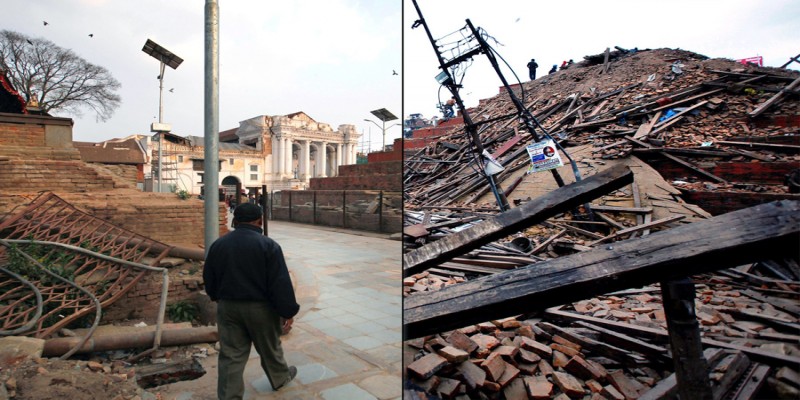
Media Monitoring of #NepalEarthquake - April 30
2015-04-30 -- HERD
In order to track the stories reported on earthquake occurred in Nepal through mainstream media and social media, HERD has started media monitoring of major news agencies such as BBC, CNN, Aljazeera, Ekantipur.com, OnlineKhabar.com, Setopati, Ratopati, My Republica.com, Pahilo Post.com, Twitter and Facebook. Based on daily media monitoring as of April 30, 2015 of 7 hours (9 am to 4 pm), the major stories covered are categorized and discussed below:
Possibility of Outbreaks
There is possibility of outbreak situation in Kathmandu valley due to poor sanitation and improper waste management. Dead bodies are starting to rot and people have started to show up in hospitals with diarrhea.
Management of Food, Drugs and Supplies
There is urgent need for tents and blankets in different places such as Kavre where 4000 people are left stranded in the open. Several agencies such as CARE have provided food kits for earthquake victims. However, there are complains that the earthquake victims in Kathmandu valley and elsewhere have complained that even basic things like food and tents are deprived even after five days of the disastrous incident.
With regards to drug supply, there are reports that the manufacturer claims having abundance of drugs but there is a lack of distribution mechanism. Government has initiated a good move by arresting retailers for selling essentials to consumers at a high price with a penalty up to two hundred thousand rupees. News agencies such as CNN also have reported that the piled boxes of rice and noodles aren’t nearly enough to meet the needs of the local people.
Sanitation
As the earthquake survivors are residing in open places, there have also been issues of cleanliness and sanitation. UNICEF reports that 1.7 million children are in desperate need of vital aid including clean water, shelter and sanitation. Some local volunteers through their own initiation cleaned BICC compound in Baneshwor sheltering 1000 people.
Emergency Health Care
World Health Organization (WHO) claims that it has been coordinating foreign medical teams (doctors, nurses and paramedics) providing emergency care services. Indian Army through Operation Maitri has been providing emergency health treatment services in two field hospitals in Sinamangal, Lagankhel and Gorkha. All India Radio also reports that Madhya Pradesh Government will send 180 tonnes of ready to eat food material. According to CNNreport, a coordinated effort of Indian Air Force and Nepalese Army medical team to launch rescue mission to bring injured people to hospitals in Kathmandu. Another organization, Child Reach International also reports that it has received a team of 8 doctors and 23 parcels of emergency medicine.
Aid Management
Foreign aid is flowing and with huge flow of aid, aid management is a big issue. United Nations has pledged to donate 15 million USD for rescue, relief, rehabilitation and re-establishment. Some examples of aid include IKEA Foundation gifting 3.3 million dollar for UNICEF for children and families. There are reports of record 19 million pound raised in a single day by Britons for earthquake victims for Nepal. UNICEF has also appealed $50 million to get more lifesaving aid. Some innovative efforts have been made for fundraising such as mountain bikers raising fund for Nepal Quake victims. JCB Machines also donates 650,000 pound worth of machinery to support relief effort diggers. Bill and Melinda Gates Foundationhas also announced response grants worth 1 million dollars to meet the critical needs of earthquake affected. Rastriya Swayamsewak Sangh (RSS) has also provided aid to 20000 people in relief camp in Bhaktapur. Prince of Saudi Arabia also generously donated 10 billion rupees to be used through International Medical Corp, Habitat for Humanity and World Food Program. Universities such as Beacon National University are setting up donation camp to support Nepalis. A small though effective initiative of was done by Sahara School providing first phase of relief in VDCs of Sindhupalchowk. Online Khabar.com reports that Federation of Nepal Chambers of Commerce and Industry (FNCCI) is providing 1 billion worth of relief package from Bhrikutimandap. Similarly, Prabhu Group has also pledged to donate Rs. 10 million as relief fund for earthquake victims. Pacific Asia Travel Association has also donated relief materials worth Rs. 150,000.
Doc 2 Doc has also listed appealing for donations: American Red Cross, British Red Cross, Cafod, Care, Catholic Relief Services, Christian Aid, Disaster Emergency Committee, Doctors for You, ICRC, Islamic Relief, Doctors Without Borders, Merlin, Oxfam, Plan, Save the Children, UNICEF, Water Aid, World Food Programme, World Vision.
Efforts from the Government
Government of Nepal has pledged to provide relief package of 9 lakhs to 253 affected VDCs. So far, it has distributed tents and essentials in affected districts totaling 26.3 million. In order to maintain law and order, the government has also issued public message to call police if the local transport agencies demand for high bus fare and has also arrested people for spreading false news.
Confusion and Criticism
Despite these efforts, there is need of crowd fund to rehabilitate villages such as Daman. Residents of Bhaktapur have been protesting the government for not providing relief. They complained of not receiving tents and other essentials, forced to live in the open. There has also been wide criticism of reports relief materials being taxed. As a government’s viewpoint, e-kantipur reports that the Minister for Information and Communication Dr. Milendra Rijal views that aid through government channel would be more effective. There has been unhealthy competition of opening accounts for relief and government says not to open any accounts without getting authorized from the government. WHO also comments through Twitter that the relief response still requires international support for essential medicines, tents and other critical needs. The Guardian reports that reconstruction effort in Nepal must incorporate safeguards against future natural disasters rather than being rushed through. There has also been wide criticism of media reporting on earthquake and media agencies such as The New York Times have provided tips about better media reporting on earthquake.
Reactions
Reactions from the public over aid management have sadly being mostly negative. Some of the comments in social media such as Twitter such as lack of coordination for relief efforts with regards to mobilizing helicopters (relief funds) and dropping tents to affected areas. There is also public mistrust over aid directly reaching out to the target audience as the people are finding out ways of contributing in such a manner that the aid directly reaches to the earthquake victims. Some agencies like UNICEF and Save the Children are worried about the dangers children face after the earthquake as well as other tough decisions to make on the face of disaster.
Rescue Efforts as of Today
Keeping aside all these issues, some tireless efforts have been put in by various agencies for rescue operations. A 4 month old baby was rescued alive today after being buried for 22 hours under rubble in Bhaktapur while a 15 year old teenager was rescued after 5 days. Nepal Army today too rescued an 11 year old girl from Bhaktapur. Pahilopost.com reports that 109 foreigners and 92 Nepalese rescued by Nepal Army helicopter from Langtang, Ghodathbel, Syafrubesi, Kyanjin monastry and Ghunche area/ Similarly 6 from Lamjung, 9 from Dhadings Budathung, Basesi and Sengjeng; 4 from Gyangfedi of Nuwakot, 10 from Syamjung of Gorkha and 18 from Tatopani of Sindhupalchowk. Tribhuvan University, Institute of Engineering today also has formed a taskforce to study the instrastructural damages caused by the devastating earthquake.
Efforts Continue …
CNN has listed supporting earthquake victims on the ground: Nepal Red Cross Society, International Federation of Red Cross and Red Crescent Societies, Action Aid USA, Action Against Hunger, Adventist Development and Relief Agency International, All Hands Volunteers, American Jewish Joint Distribution Committee, American Jewish Worldwide Service, Americares, CARE International, Catholic Relief Services, Child Fund International, Concern Worldwide, Convoy of Hope, Direct Relief, Empower Generation, Global Giving, Habitat for Humanity, Handicap International, International Medical Corps, International Relief Teams, Islamic Relief USA, Jewish Federations of North America, Lutheran World Relief, MAP International, MercyCorps, Operation Blessing International, Operation USA, Oxfam International, Plan International, Real Medicine Foundation, Save the Children, Salvation Army, Samaritan's Purse, Seva Foundation, Shelter Box, UNICEF, World Food Programme, World Vision.
These organizations have been working day and night for relief efforts but there needs a coordinated mechanism between government and non-government bodies. There are also recommendations for effective aid management such as systematic coordination, aid transparency, avoid medical voluntarism, reach the rural poor and better reconstruction.
Read more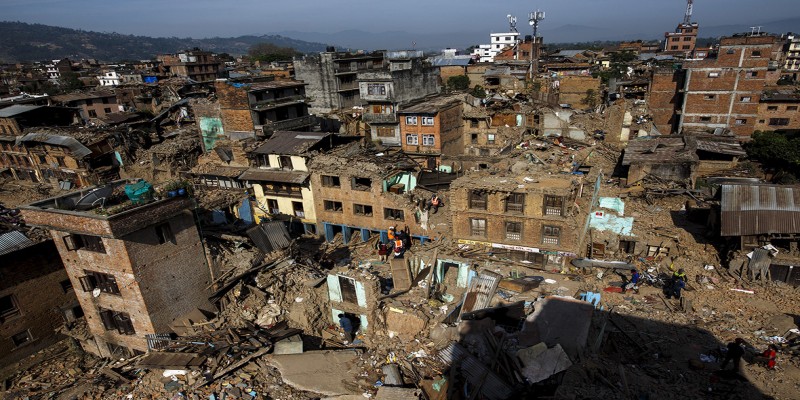
Nepal Shakes - Pledge for Public Health Action
2015-04-04 -- HERD

Health Research and Social Development Forum (HERD) with its vision of promoting health and wellbeing of people - extends its helping hands to support earthquake victims.
As a public health action to support Ministry of Health and Population (MoHP) in providing emergency relief services for the earthquake victims, we are urging everyone to support the nation grieving the loss of lives and property.
As a gesture of support, HERD has established a Helping Hand for Humanity Fund with initial support of Rs. 50,000 (Fifty thousand rupees equivalent to 490 USD). Interested contributors could express their willingness of support as donation into HERD's account:
Bank: Nepal Investment Bank Limited, Putalisadak, Kathmandu; Account Name- Health Research and Social Development Fund (HERD); Account Number- 01205030098321; Swift Code: NIBLNPKT
Total amount collected into the fund will be directly transferred to the government's relief fund through Ministry of Health and Population. Interested donors are requested to fill up this form.
We are also calling for humanitarian support for all Nepalese citizens and foreigners including HERD members, staff, field researchers, volunteers, outreach workers and well wishers to extend their helping hand for humanity. Interested individuals are requested to fill up this form: https://docs.google.com/forms/d/1LX5DOtmoZI7qV1owk8pHmzHeE23J3Lu1esNqxiO...
Let's be a part of MoHP and HERD in assisting earthquake victims in this dire need through distribution of supplies, providing first aid and other relief services in affected areas.
Read more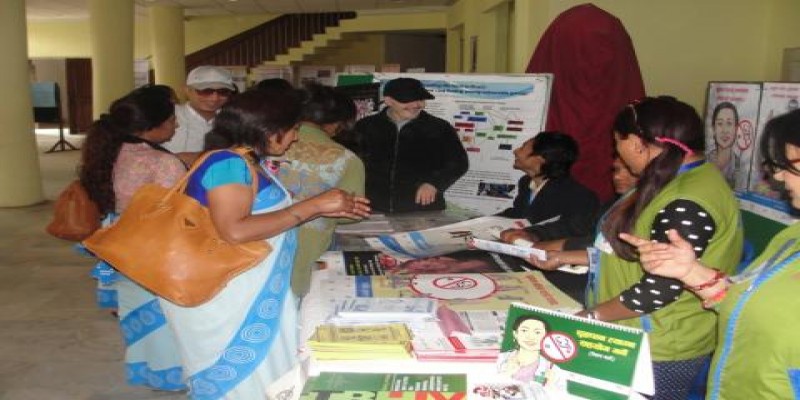
World TB Day 2015 Celebrated
2015-01-01 -- HERD
World TB Day 2015 was celebrated in Nepal with various activities. The slogan for this year was: "Reach the 3 Million: Reach, Treat, Cure Everyone." Ministry of Health and Population, with the support of National Tuberculosis Centre organized a national event on this occasion with participation of various divisions and departments of the ministry and civil society organizations actively working in the sector of TB control. Dr. Yagya Bahadur Karki, Member of National Planning Commission was the Chief Guest of the event.
MoHP Secretary, Mr. Shanta Bahadur Shrestha expressed his commitment on behalf of the ministry to continue government’s efforts in TB elimination. He also acknowledged the fact that there is heavy reliance on external funding with regards to TB control and therefore, government is focusing on sustainability of the programme to reach out to the unreached population. The Secretary also highlighted government’s plan to scale up community DOTS programme from 11 piloted districts to all 75 districts. Director of National Tuberculosis Centre, Dr. Bikas Lamichhane expressed his satisfaction that there has been a significant increase in the idenfitication of Drug Resistant TB cases in Nepal.
Voice from the civil society was also heard during the national event. Mr. Devendra Pradhan, Civil Society Representative and President of NATA recommended for more private sector engagement to work towards combined initiatives for TB control. Some issues were also raised during the event with regards to termination of contract of National Strategic Application (a national TB control programme in Nepal) – which was funded by Global Fund and the negative implication affecting routine programme activities and the national programme being affected severely due to heavy reliance on external funding agencies. Mr. Pradhan also urged the government to take the initiative to create enabling environment to conduct TB programmes in Nepal.
The event was also covered widely by national media outlets (print, radio and television). Dr. Sushil Baral, Executive Director of HERD interacted with the media to discuss on the current situation, current and future funding environment on TB related national programmes, great success of innovative approach of TB REACH – thereby reaching the unreached population using mobile vans and GENEXpert technology.
This event also provided great opportunity for national organizations working in the sector of TB to showcase their initiatives through different stall displays.
Some snapshots of the event:





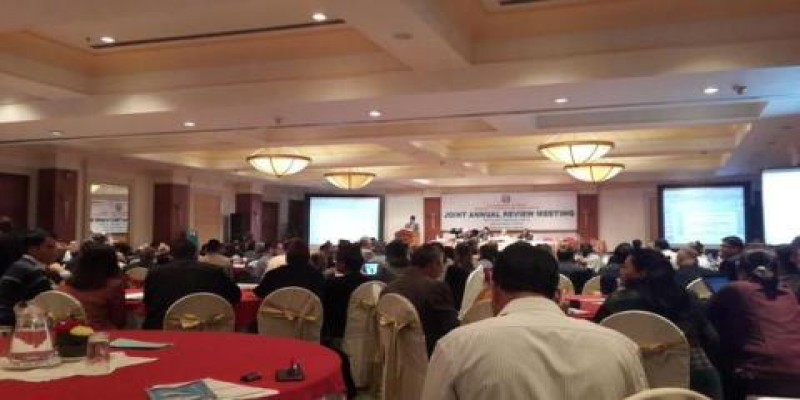
Joint Annual Review 2015
2015-01-01 -- HERD


HERD is facilitating the Joint Annual Review Meeting 2015 with wide engagement of the government, external development partners and civil society. This three day event is organized from February 23 to 25 at Hotel Everest, Kathmandu. This event reflects on the progress of Nepal Health Sector Programme (NHSP) 2010-15.
Read more
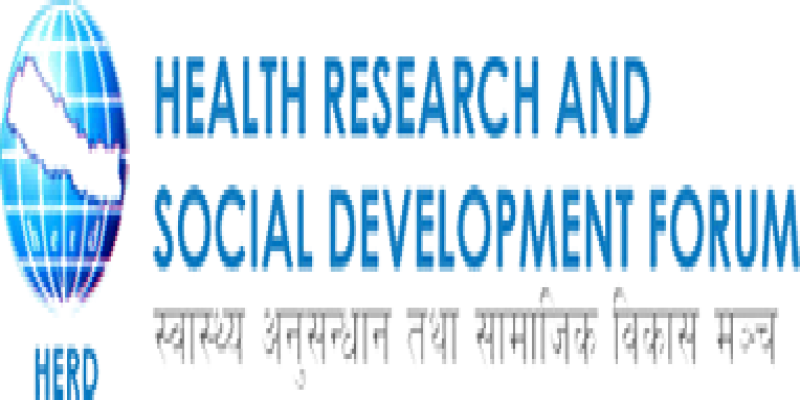
HERD Calls for Director - Research and Evaluations
2015-01-07 -- HERD
Health Research and Social Development Forum (HERD) calls for Director – Research and Evaluations, primarily responsible for leading, managing, coordinating research and evaluation projects at HERD for 2 years.
Director – Research and Evaluations will work closely with Executive Director, Research and M&E team and will be directly supervised by Executive Director of HERD. The engagement will be highly demanding – in terms of dedication towards entire management of research and M&E projects. We are currently implementing output-based funding projects and therefore, no compromise will be made in terms of meeting gold quality standards. The Director will be primarily based in HERD’s office in Kathmandu with frequent field visits to the project districts.
Are you the right fit?
We expect applicants to be exceptional in the sector of health research and evaluations, especially handling technical and managerial aspects of the research continuum effectively. He/She should be:
- a DREAMER who envisions the future opportunities for the organisation and works towards achieving those opportunities defining strategic pathways
- a DESIGNER who designs high quality frameworks and tools addressing the project aims and objectives
- a MANAGER who coordinates with national and local authorities effectively during the project start-up, implementation and completion phase as well as monitor and supervise performance of the project teams
- a TRAINER who orients the conceptual and practical aspects of research and M&E projects to the data collectors (Research Officers and Research Assistants)
- an ANALYST who analyses the collected data and present it in a high quality report
- a COMMUNICATOR who communicates the research and evaluation findings at the policy level effectively
Most importantly, we are looking for a LEADER who works in the team, takes risks – being proactive in thinking, takes ownership of the projects, does effective planning, forecasts the possible challenges, devises appropriate mitigation measures and above all, takes his/her role seriously.
What should you do?
The Director – Research and Evaluations will have the following four major roles and responsibilities to perform:
Initiation of Project Preparation by
- assisting the Executive Director, Research and M&E Team in outlining the project objectives by providing technical expertise
- coordinating with our partners regarding expected role and Scope of Work of HERD as an implementing agency
- leading the M&E design/framework of various projects
Oversight of Data Management by
- coordinating with local organisations, stakeholders, partners and government officials to ensure effective project implementation
- monitoring and supervising the data collection teams – Senior Research Officers, Research Assistants and Field Researchers through field based and desk monitoring
- communicating with our partners regularly with key agreed deliverables and other major issues occurred during the field implementation
- ensuring that team performance and output (field data collection procedures including ethical considerations) meet the desired gold quality standards
Assurance of high quality product outputs by
- ensuring that high quality data management procedures are followed with detailed oversight on transcription, translation and coding of qualitative data; database management, coding, double data entry, labelling and cleaning of quantitative data
- ensuring that there is rigorous analysis of the data with constant reflection about whether the findings are in line with the set project objectives
- ensuring that the final products (activity reports and final study reports) are highly standardised in terms of outlook, language, structure, coherence and presentation
Contribution to organisational development by
- developing organisational strategies and pathways identifying potential areas of research and M&E in close coordination with the Executive Director and Business Development Team
- being the face of HERD – leading HERD’s visibility in national and international forums along with Executive Director through presentations, speeches and other medium
- developing a high performing research and M&E team – motivating the existing members, exploring potential members and devising strategies attracting them to work at HERD
What should you have?
We are looking for high performing and high performed professional in the field of health/social sciences/ development studies and similar disciplines preferably with a PhD with minimum 2 years of experience or a Masters Degree holder with at least 5 years of experience in management of health related projects.
Must Skills
The following skills are a must to be considered a potential for this post:
- Demonstrable experience in leading and managing research/evaluation studies and programmes of national scale
- Quantitative and Qualitative research design and analysis skills
- M&E framework design and implementation skills
- Exceptional report writing skills
- High-quality training and presentation skills
- Efficient use of software (MS Office, Atlas.ti/NVivo, SPSS/CSPro)
- Superb communication skills (both verbal and written)
Contact Us:
If you think you can handle this major responsibility, email us with your Letter of Intent and updated CV at: vacancy@herd.org.np/info@herd.org.np with the subject line: ‘Application: Director – Research and Evaluations’ by 5pm, January 21, 2015.
Read more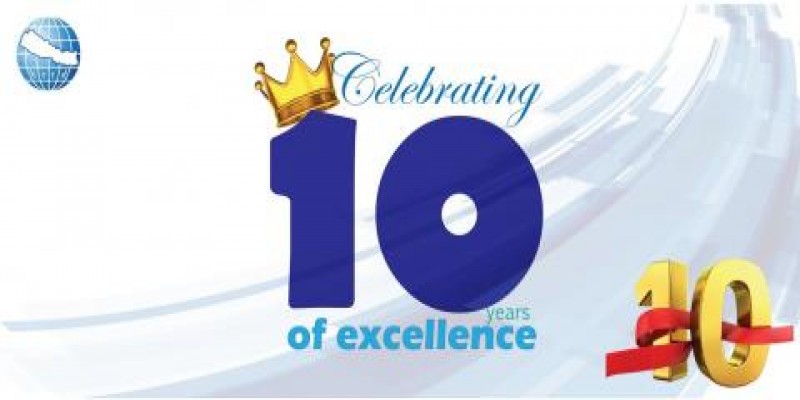
HERD celebrates its 10th anniversary
2014-12-23 -- HERD
HERD is celebrating its 10 anniversary today on December 23, 2014 conducting variety of programmes. A blood donation programme was organised in HERD premises in Thapathali where HERD family members volunteered to donate blood on this auspicious day with the message - "a single pint can save three single lives, a single gesture can create a million smiles".

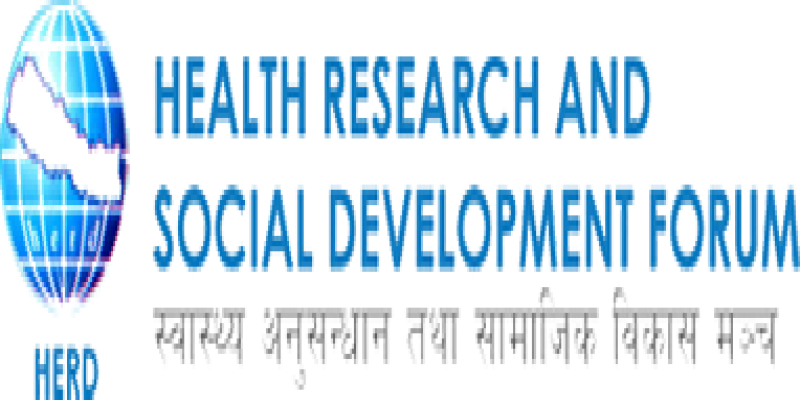
Opportunities for UK Public Health Registrars
2014-12-08 -- HERD
We are looking for a phase 3 registrar to work with their team in Nepal. One year placements would be preferred but shorter time periods are also possible, particularly depending on deanery requirements.
As a registrar working with HERD you would have the opportunity to work on a variety of research and/ or implementation projects.
The projects that HERD are currently working on include:
Urban health:
· implementation through a primary care clinic based in one of Kathmandu’s largest slums
· urban health policy development
· understanding the health needs of the urban poor through cross-sectional household surveys
TB:
· TB Reach project involving active case finding among vulnerable groups across Nepal using Gene-Xpert diagnostics
· Developing and testing a patient psychosocial support package among patients with multi-drug resistant TB.
Tobacco:
· Research and support to government to implement smoking cessation within primary care.
Human Resources for Health:
· Development and testing of an intervention to improve health worker performance.
Other large cross-sectional studies to assess and inform government and donor policy in areas such as adolescent sexual health, safe motherhood, health sector service provision, human resources.
To date 3 registrars have been placed with HERD - all willing to be contacted to discuss their placements with interested individuals: 2014 – Caroline Rumble (carolinerumble@hotmail.com); 2013 – Katy Scammell (katy.scammell@yahoo.co.uk); 2012 – Helen Elsey (h.elsey@leeds.ac.uk). All have really valued their placement and found they had opportunities that would be hard to find in a developing country / UK placement. A wide range of competencies can potentially be signed off during the HERD placement including under the following key areas: surveillance and assessment, policy and strategy development, collaborative working, health and social service quality, academic public health, and public health intelligence.
If you are interested in working with HERD, in the first instance, please be in touch with Helen Elsey, Nuffield Centre for International Health and Development (NCIHD), University of Leeds: h.elsey@leeds.ac.uk to discuss further. Please send through your CV. You will then be interviewed by Dr Sushil Baral, the Executive Director of HERD.
HERD – We are a dynamic national non-governmental organisation promoting evidence informed policies and practices for sustainable development in health, environment and social sectors to improve quality of life. We are change catalysts as we operate through our ‘3Is’: Intervention – seeing the opportunity; Innovation – changing the course and Impact – bringing the change.
Read more